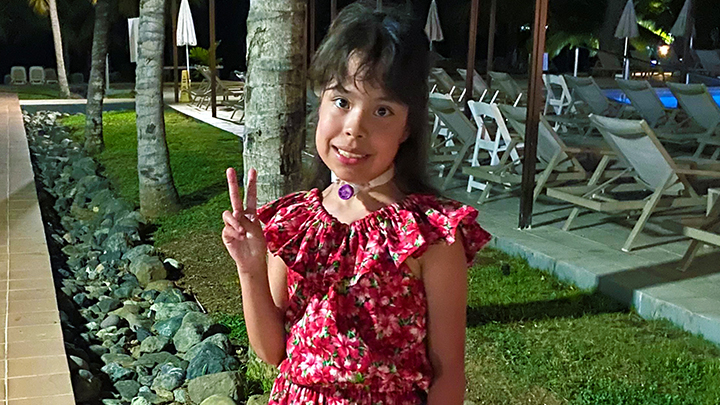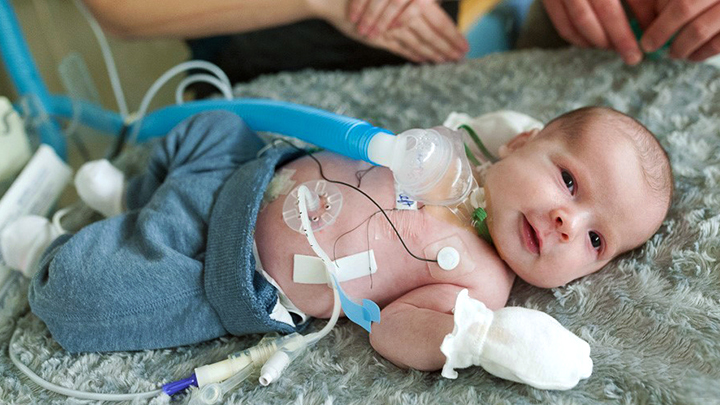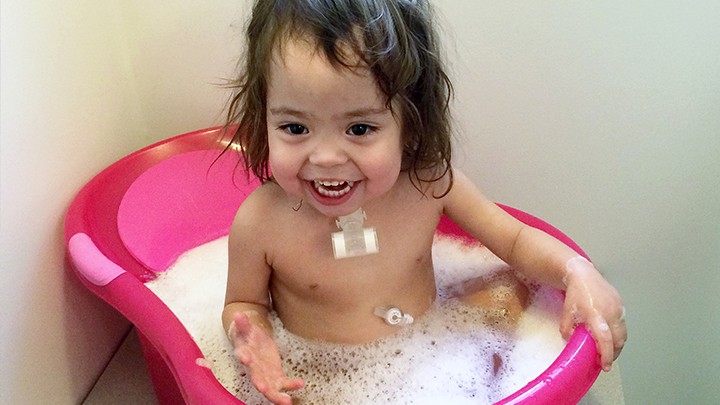

The journey of a child who needs a tracheostomy can be challenging for the child, family, and caregivers. In Alberta, there is support for families to manage the care and well-being of a child with a tracheostomy.
Pediatric tracheostomy programs in Alberta provide a range of services throughout a child’s tracheostomy journey, from early decision-making to daily tracheostomy care.
ON THIS PAGE:
About|Your Healthcare Team|Wellness Supports|Financial Supports|Rural Alberta Families|Outpatient Supports

A pediatric tracheostomy is a surgical procedure that creates an opening in a child’s windpipe (trachea) to allow them to breathe more easily.
Visit Pediatric Tracheostomy on MyHealth.Alberta.ca to learn more about the procedure and what to expect during your child’s journey.
All children with a tracheotomy will have the following team follow them throughout their journey:
You are an important part of your child’s care while they are in the hospital. You will work with your child’s healthcare team to make important decisions about what is best for your family.
At first, you will work with the healthcare team in the Pediatric Intensive Care Unit (PICU), where the decision for tracheostomy usually happens.
When your child has a tracheostomy and leaves the PICU, a team of healthcare providers will support all aspects of their care in the hospital.
Find out who is involved in the care of your child while they are in the Pediatric Intensive Care Unit (PICU) or the Neonatal Intensive Care Unit (NICU).
Members of your home care team will participate in the multidisciplinary tracheostomy outpatient care program weekly and maintain regular communication with your child’s pediatric respirologist about their health status.
A case manager will help you prepare to care for your child at home. Your child will also have a home care team which may include a nurse, respiratory therapist, physiotherapist, social worker, and occupational therapist. They will be responsible for your child’s care in the community.
Based on the number of medications and therapies your child needs at home, your case manager and home care team will decide how much support you need.
Learn more about Preparing for Home.
Your home care team participates in the tracheostomy outpatient care program. They share information about your child’s health with your child’s pediatric respirologist.
Based on your child’s needs and interventions support services such as nighttime care and daytime respite will be discussed with you by your Case Manager.

The following wellness supports may be available to you and your family:

These resources may not apply to every situation. Your child’s case manager and social worker will advise you on what may apply to your child’s unique care.
As you prepare to go home, you will be in contact with the home care team in Edmonton or Calgary and the local case manager in your community.
Your local case manager is your best resource to understand what services and supports are available close to your home. Speak to your case manager if you have any questions.
EMS support may also depend on where you live.
In Edmonton/Calgary, calling 911 means relatively quick access to EMS directly coming to their home even in the winter with poor road conditions.
In smaller communities, accessing EMS services may depend on local road conditions and how clearly roads and addresses are marked. Some rural areas do not have local EMS in place and rely on EMS in other areas. This means response times could be longer.